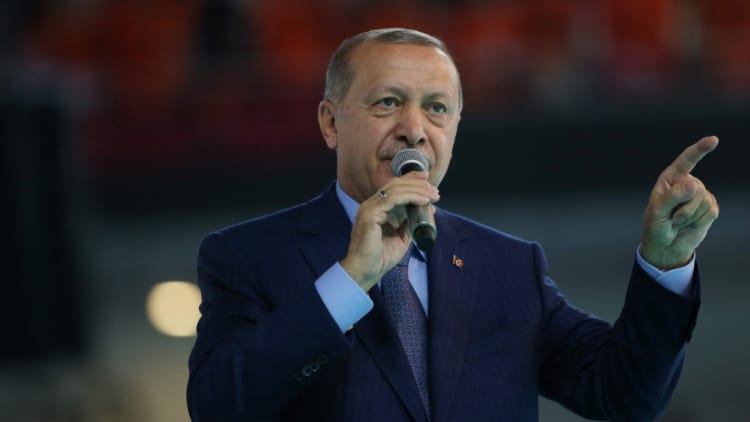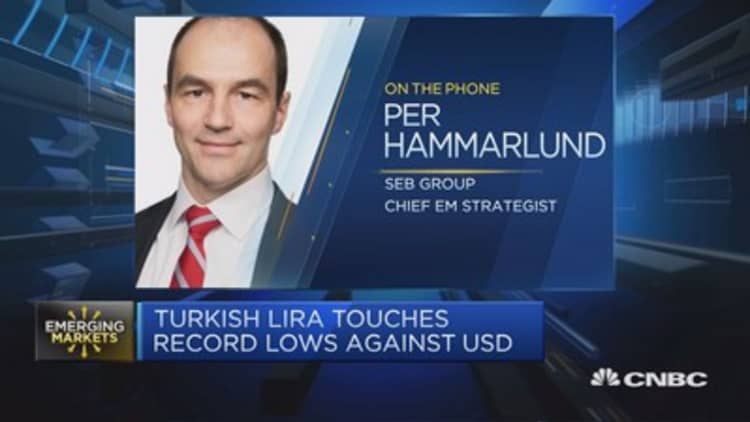A Turkish delegation is meeting Washington officials this week for talks centered on Ankara's detention of American pastor Andrew Brunson and the widening rift between the two NATO allies.
The meeting, confirmed by the U.S. State Department, will take place Wednesday amid turbulent times for Turkey's economy. Its currency, the lira, weakened Wednesday after recovering slightly the previous day on news of the talks.
Poor U.S.-Turkey relations, most recently manifested in the announcement of U.S. sanctions on two Turkish ministers, is the latest hammer blow to the lira, which has lost 40 percent of its value against the dollar this year.

The currency hit a record low of 5.4250 against the greenback Monday after Washington revealed it was examining Turkish export access to U.S. markets. Turkey's exports to the U.S. constitute $1.7 billion in revenue and an important source of dollars for the country.
The lira firmed to 5.2260 after the delegation's planned visit was announced, but fell back to 5.2935 at 1:30 p.m. Istanbul time (6:30 a.m. ET) Wednesday. The yield on Turkey's 10-year bond was 18.36 percent at that time, after its price hit a record low Tuesday with a yield of around 20 percent. Bond prices move inversely to yields.
The White House is pressuring Turkish authorities over the release of Brunson, who Ankara has detained since 2016 on charges of spying and involvement in a failed coup that year, allegations the evangelical pastor denies.
The Trump administration froze the overseas assets of Turkey's justice and interior ministers, who it says are responsible for the detention, shortly after Brunson was moved from jail to house arrest. Turkey responded by saying it would issue the same sanctions on two American cabinet secretaries, if they possessed any assets in Turkey.
The flashpoint is the latest in a series of disputes between the two countries over issues including Turkey's policies in Syria and its purchase of Russian weapons systems alongside American F-35 jets. Relations are being described as at a record low. Washington's recent imposition of sanctions, and threat of further restrictions, serves as a message from the Trump administration that Turkey's role as a NATO ally and strategic partner does not afford it special treatment.
Self-inflicted economic wounds
Most of the lira's fall can be blamed on the Turkish central bank's refusal to sufficiently raise interest rates in order to counter runaway inflation — now at more than 15 percent — and a widening current account deficit. Investors have been selling off Turkish assets as markets question the central bank's independence, widely seen as influenced by President Recep Erdogan, who has called himself the "enemy of interest rates," prioritizing fast growth over inflation tempering.
But an interest rate rise may not be enough to save the lira at this point, warned Per Hammarlund, chief emerging markets strategist at SEB Group.
"First of all, [Turkey] probably needs to hike interest rates again, but I don't think really that's the problem," Hammarlund told CNBC's "Street Signs Europe" on Wednesday. "The government needs to make it abundantly clear that the central bank is independent. The way Erdogan has been cagey about it and even suggested he'd increase control over the central bank, an interest rate hike doesn't really cut it at this point, given the threat to the central bank's independence."

The bank's most recent meetings only further worried investors as they produced no move on rates, despite the newly-appointed Finance Minister Berat Albayrak, Erdogan's son-in-law, publicly alluding to a more market-friendly monetary policy.
"Every time they have a chance to address the core issues, they're not taking them," said Andrew McCaffery, head of strategic investment solutions at Aberdeen Standard Investments. "It is something of their own doing and there doesn't seem to be any clear way out at the moment."
While the revelation of the planned talks comes as welcome news for many investors, the possibility of a doubling-down from Erdogan, fueled by nationalist support, would only throw the country's economy into further peril. In terms of foreign policy, it could also push Turkey closer to Russia. Relations between the two have been warming of late, and Moscow will likely welcome an opportunity to take advantage of cracks in the NATO alliance, already strained by Trump's regular criticism of its members.
The difficulty in predicting the outcome of the current crisis, analysts say, is that it involves politics and trying to predict the actions of both Erdogan and Trump — two outspoken leaders known for a dedication to their nationalist support bases — and how aggressively sanctions could intensify if Turkey does not acquiesce to U.S. demands.


